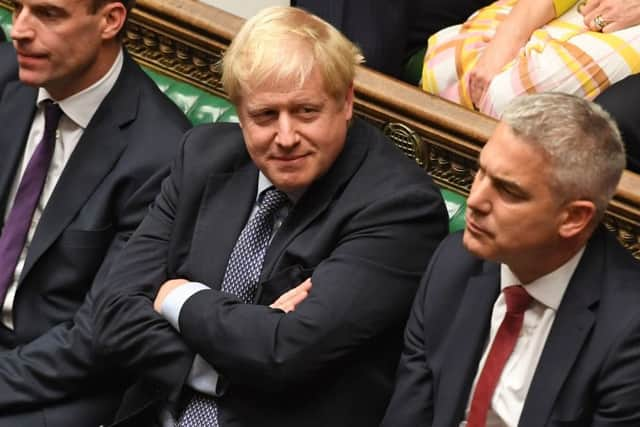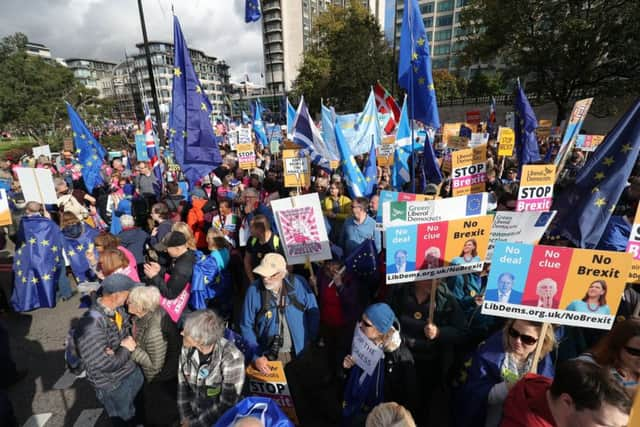Boris Johnson’s Brexit deal leaves us shackled to Brussels - Brian Monteith
Watching Saturday’s proceedings in the House of Commons was like going to a cup final only for it to be abandoned due to fog, making it impossible to see the ball. It was the anti-climax to trump all anti-climaxes when the public was looking for a resolution – yet it could still get worse. This parliament has a bad habit of throwing up an unseen twist, an even greater outrage, just when you think it cannot behave any worse.
This week we may not yet see the Prime Minister’s withdrawal treaty voted on and, even if it is, it may come attached with amendments that force a referendum that remains a minority view. So frustrated and tired has the public become of our MPs’ behaviour that the largest support (41 per cent) is now for leaving without a deal than remaining a member of the EU.


A cute draft treaty
Advertisement
Hide AdAdvertisement
Hide AdWith all these political feints, bluffs and the skulduggery of the current Speaker, the tragedy is the Prime Minister’s deal is not receiving the public scrutiny it deserves. Having had his negotiating position undermined to the point of making him a political eunuch, his “deal” throws British unionists under a bus to claim a difference to that of his predecessor.
The Prime Minister’s draft treaty is cute; it gives the appearance of being better than Theresa May’s attempt because it allows him to claim he is taking the UK out of the EU’s customs union, but when studied closely it achieves no such thing.


Northern Ireland will remain in the EU’s customs union for goods entering the province from the rest of the UK, treating it differently by requiring paperwork to be processed where it has never happened before.
Yes, Northern Ireland will eventually be able to alter this position by a vote in Stormont after 2020 – but that requires Stormont to be sitting, and if it is suspended, as currently, a complex process of adjudication will ensure nothing changes. Once immersed in the new arrangement, Northern Ireland will never come out of it – some might welcome that, but I for one do not.
Furthermore, if we genuinely wish Great Britain and Northern Ireland to become whole again, as one United Kingdom, then we cannot allow any of our regulations to diverge. Thus the EU’s backstop is preserved by stealth rather than law. It will lie in the Irish Sea like some submerged political minefield, waiting to sink our constitutional arrangements if we dare cross it.
Scotland
Already we are hearing the predictable arguments of Scottish nationalists demanding Scotland be treated the same, that it should enjoy a special economic relationship with the EU but without the need for a border with England. Given past pusillanimous behaviour of Conservative politicians in talking tough and then caving in to nationalist demands (think David Cameron giving in to Alex Salmond on the referendum date, question and franchise), who is to say this will not become the new reality when it suits them?
Supporters of the “deal” exclaim “Get Brexit done” as if this is a line to be crossed beyond which all the interminable media coverage to the exclusion of practically everything else, all the deep divisions, all the family and personal fallings-out will be gone. Let me tell you they will not.
The detail of the latest withdrawal treaty ensures we shall be locked in to discussions over the EU free trade deal (the real “deal” that would be nice to have but is not vital) for another decade. The transition will become permanent.
Advertisement
Hide AdAdvertisement
Hide AdTo understand why our Brussels bosses are satisfied the deal works for them, we need to look at Johnson’s withdrawal treaty through the lenses of the EU. If it is to pass muster it must allow us to take back control of our laws, our trade and our taxes. Yet it fails in all three.
The deal
The European Court of Justice will still have sway over any trade deal.
We will not have control of our tax policy during or after transition unless we leave without a deal in 2022.
Yes, British fishing grounds will become ours to manage again – but the deal makes it clear they shall be bargained away once more.
We shall continue to have massive contingent liabilities when the next euro crisis starts, as inevitably it shall.
Our involvement in EU defence and security infrastructure will compromise our own forces’ autonomy and imperil our place in the five-eyes intelligence (US, UK, Canada, Australia, New Zealand) that provides us with priceless protection.
Foreign policy is the mark of a sovereign nation, yet foreign policy will be permanently restricted – along with our ability to take military action. Let me give an example of what I mean. Under Johnson’s “deal”, were the Falkland Islands to be invaded by Argentina and the EU wanted at all costs to avoid a falling-out with the South Americans, the UK would not be free to even contemplate sending a taskforce to liberate them were it able to.
Worse still, the government of the day would be advised by our own civil servants that only diplomatic means in agreement with the EU would be possible. The public would never hear why our own actions could not be considered as a possible option.
Advertisement
Hide AdAdvertisement
Hide AdRather than being able to determine our policy, the UK would be a satellite to the EU, like Costa Rica is to the United States.
In the real world, if politicians of any party support Johnson’s offering they cannot complain about it later, saying they were not told, did not understood the detail or were lied to. Politicians who see the “deal” differently have a duty to point out its failings and dangers.
If it falls in Westminster, as I believe it should, those supporting Brexit shall be free to continue pursuing a pathway to achieving a genuine Brexit for the whole of the UK knowing the pitfalls to avoid.
If it passes, we must redouble our efforts to ensure all those claims being made of it are indeed delivered by holding its advocates to account. Eventually, though, the people will rumble what has happened and opponents such as those in the Brexit Party need to be there for that day.
Either way, let the Tories own the outcome of their deal and face the consequences of their unnecessary compromises.
Brian Monteith MEP is chief whip of the Brexit Party in the European Parliament